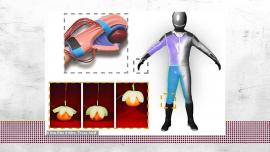
Five inducted into Bouchet Graduate Honor Society
Five Cornell doctoral candidates have been inducted into the Cornell chapter of the Edward A. Bouchet Graduate Honor Society. Read more

Five Cornell doctoral candidates have been inducted into the Cornell chapter of the Edward A. Bouchet Graduate Honor Society. Read more
Cornell researchers have discovered an inexpensive and accurate method for self-driving cars to detect three-dimensional objects, potentially revolutionizing the autonomous vehicle industry. Read more
From robots playing video games to the next Uber competitor, cutting-edge technologies created by more than 200 students will be on display at BOOM 2019 on April 24, from 4-6 p.m. in the Duffield Hall atrium. Read more
Cornell students shared their global experiences through posters April 15 at the 2019 Community Engagement Showcase. Read more
Events include a screening of “On the Basis of Sex” by Cornell Cinema, a free estate planning clinic, an exhibition of work by a student artist at the Seneca Place office building downtown, a panel discussion as part of the Cornell University Press sesquicentennial celebration, and a “Chats in the Stacks” book talk with English professor Daniel Schwarz. Read more
Engineer, entrepreneur, innovator and philanthropist Irwin Jacobs ’54, BEE ’56, will speak at Cornell and be presented with the second Cornell Engineering Distinguished Alumni Award on Monday, April 22, at 4 p.m. in 101 Phillips Hall Auditorium. Read more

NASA’s Management and Development of Spacesuits audit in 2017 noted that NASA continues to manage an array of design and health risks associated with the current suit worn in space, the Extravehicular Mobility Unit (EMU). A new intelligent hybrid SmartSuit design proposed by Dr. Ana Diaz Artiles from Texas A&M University has the potential to solve some of these issues. Her co-investigator, Dr. Robert Shepherd, associate professor at Cornell University, will analyze material and mechanical metrics for manufacturing the SmartSuit and will also perform preliminary experimental validation of its... Read more
Students, researchers and companies working to solve some of today’s biggest challenges in the energy industry gathered April 10 for the inaugural Cornell Energy Day. Read more
Ten Cornell undergraduate and graduate students traveled 23 hours and 7,600 miles to the South Pacific island nation of Tonga to see what climate change really looks like. Read more
Researchers have collected and analyzed health-related internet search terms from all 54 countries in Africa, finding that searches such as “Does garlic cure AIDS?” can reveal pockets of disease prevalence, cultural stigmas and urgent needs for accurate health information. Read more